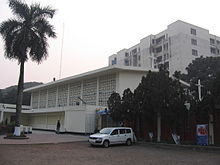|
Bengali Christians
Bengali Christians (Bengali: বাঙালি খ্রিস্টান) are adherents of Christianity among the Bengali people. Christianity took root in Bengal after the arrival of Portuguese voyagers in the 16th century. It witnessed further conversions among the Bengali upper-caste elite during the 19th century Bengali Renaissance. Bengali Christians played significant role in Bengali culture, education, commerce and society. Some of the most influential thinkers and advocates during the Indian independence struggle from British Raj where Bengali Christians. The region is home to venerable missionary institutions, including the Missionaries of Charity founded by Mother Teresa.   History Christianity was established in Bengal by the Portuguese missionaries in the 16th century. Basilica of the Holy Rosary, Bandel is the first church known to have been constructed in 1599 at Hugli-Chuchura in the Hooghly district of West Bengal, India. Another is known to have been established from the historical records was in Ishwaripore, Jessore (erstwhile Chandecan) in 1600 under patronage of Pratapaditya which later was ransacked.[3] Chittagong (erstwhile also referred to as Diang) with significant Portuguese and trading settlements had first hermitage and churches erected around this time. The Portuguese settlement in Chittagong hosted the first Vicar Apostolic in Bengal.[4] The Portuguese from there moved to Arakan, where they would transport Hindu and Muslim slaves, about 42,000 in number from 1621 to 1624, and converted 28,000 of those enslaved peoples to Christianity.[5] Jesuit missionaries also established churches in Bandel and Dhaka. In 1682, there were 14,120 Roman Catholics in Bengal.[2] DenominationsRoman Catholic ChurchThe Catholic Church in Bangladesh is based in the Archdiocese of Dhaka, with dioceses in Dinajpur, Mymensingh, Sylhet and Rajshahi and Archdiocese of Chittagong, with dioceses in Barisal and Khulna.[6]
The Roman Catholic Church in West Bengal is based in the Archdiocese of Calcutta.
United ProtestantismIn the Indian subcontinent, various Protestant denominations merged to form United Protestant Churches, such as the Church of North India and the Church of Bangladesh.[7][8][9] St. Thomas Cathedral is the seat of the Metropolitan Diocese of Dhaka of Archbishop of Church of Bangladesh. There are three dioceses of the United Protestant Church of Bangladesh:
St. Paul's Cathedral, Kolkata is the seat of the Diocese of Calcutta (1813) of the United Protestant Church of North India (CNI).
Other denominationsOther denominations include:[6]
DemographicsBengali Christians are considered a model minority in South Asia and usually enjoy a high literacy rate, low male-female sex ratio and a better socio-economic status.[10] Christian missionaries operate many schools, hospitals and shelters for the poor. They receive support from the Indian and Bangladeshi governments. Dhaka, Chittagong, Barisal, Khulna and Northern District Side have significant Christian populations. CultureLusophone heritageSome Catholic Bengali Christians have Portuguese surnames. In a tradition similar to Bengali Muslims (who have Arabic and Persian names), Bengali Christians adopted Portuguese surnames due to the early influence of Portuguese missionaries in spreading Christianity. Common Catholic Bengali Christian surnames include Gomes, Rozario, D'Costa, Gonsalvez, Cruze, Dias, D'Silva and D'Souza among others.[11] Christmas is known as "Boro Din" (Big Day) and is a public holiday in both Bangladesh and Indian West Bengal. Notable Bengali Christians
Religious Leaders
Rt. Rev. Paritosh Canning 21st Bishop, Diocese of Calcutta, Kolkata Freedom FightersArts
Industry
Scholars
Educators
Politicians
Bangladesh ArmyIndian Defence Services
Sports
See alsoReferences
|
|||||||||||||||||||||||||||||||||||||||||||||||||||


